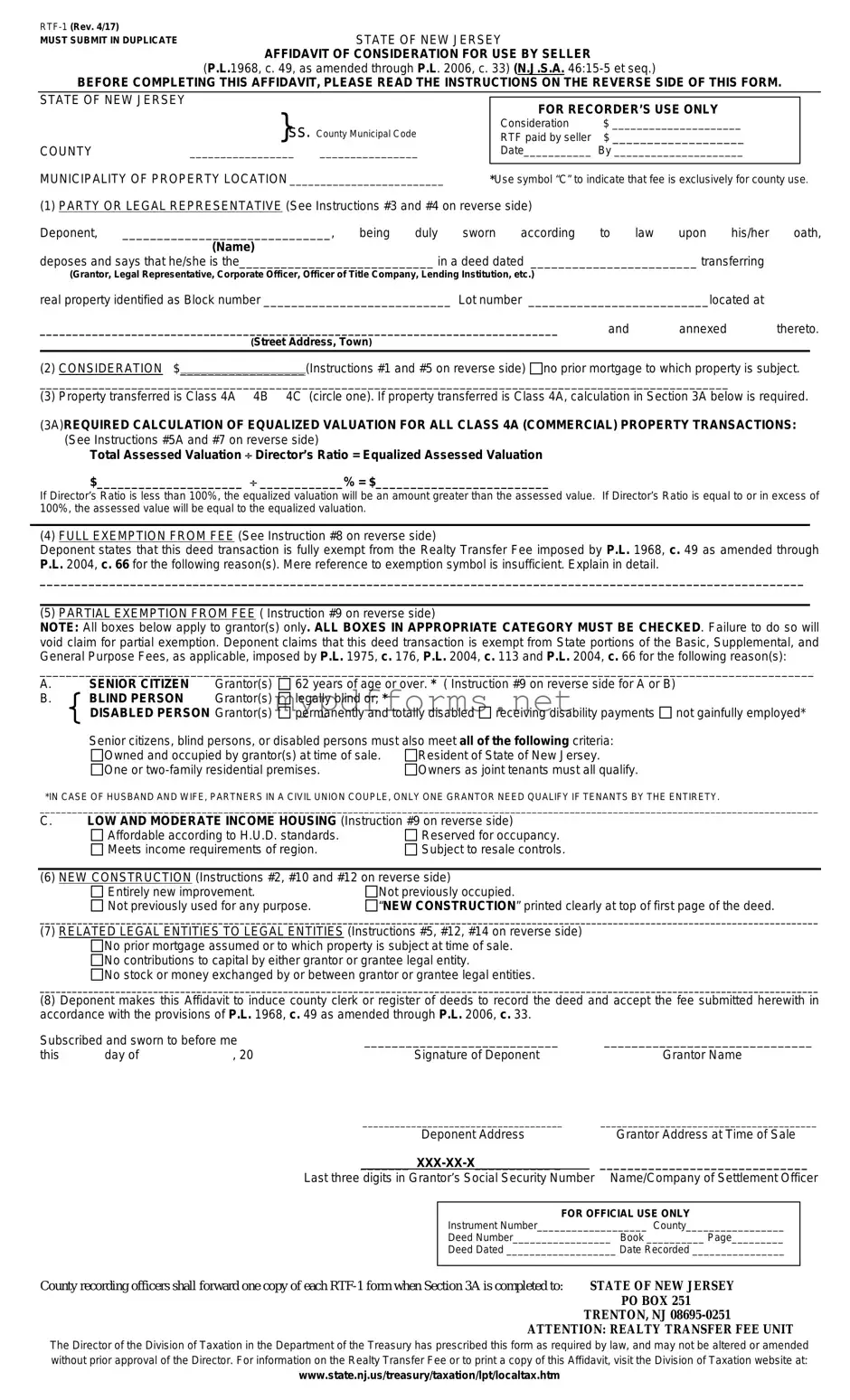The New Jersey Affidavit of Consideration RTF-1 form is similar to the New Jersey Deed form, which is used to transfer ownership of real property. Both documents serve as official records that detail the transaction between parties. While the Affidavit of Consideration outlines the financial aspects and considerations involved in the transaction, the Deed itself provides a legal description of the property being transferred. Together, they ensure that the transaction is documented and recognized by the state.
Another comparable document is the New Jersey Quitclaim Deed. This form allows a property owner to transfer their interest in a property to another party without making any guarantees about the title. Like the Affidavit of Consideration, the Quitclaim Deed is often used in situations where the parties know each other well, such as family transfers. Both documents help clarify the intentions of the parties involved, although the Quitclaim Deed does not address the financial considerations directly.
The New Jersey Warranty Deed also shares similarities with the Affidavit of Consideration. This document not only transfers property ownership but also provides a guarantee that the seller holds clear title to the property. While the Affidavit focuses on the financial details of the transaction, the Warranty Deed ensures that the buyer is protected against future claims. Both documents are crucial in real estate transactions, providing layers of protection and clarity for the parties involved.
The New Jersey Bill of Sale is another document that has a similar purpose in terms of transferring ownership. While it typically pertains to personal property rather than real estate, it serves to legally document the sale and transfer of items. Like the Affidavit of Consideration, the Bill of Sale often includes details about the transaction, such as the sale price and the parties involved. Both documents help to prevent disputes by providing clear evidence of the transaction.
The New Jersey Contract of Sale is also relevant in this context. This legal document outlines the terms of a real estate transaction, including the purchase price and conditions for the sale. While the Affidavit of Consideration focuses specifically on the financial aspects, the Contract of Sale encompasses a broader range of terms and conditions. Both documents work together to ensure that all parties understand their obligations and rights during the transaction.
Similar to the Affidavit of Consideration is the New Jersey Real Estate Transfer Tax Declaration. This form is required for any transfer of real property and is used to report the sale price to the state for tax purposes. While the Affidavit details the financial considerations of the transaction, the Transfer Tax Declaration ensures that the appropriate taxes are calculated and paid. Both documents are vital for compliance with state regulations.
The New Jersey Statement of Information is another related document. This form provides essential information about the parties involved in a real estate transaction, including their identities and contact information. While the Affidavit of Consideration focuses on the financial aspects, the Statement of Information serves to establish transparency and accountability among the parties. Both documents contribute to a smoother transaction process.
In the context of property transactions, various forms play crucial roles in ensuring proper compliance and transparency. One such essential document is the Illinois Unclaimed Property Reporting form, which shares similarities with other forms used across different states, including the New Jersey Affidavit of Consideration. Just as the affidavit provides a sworn statement regarding property transfers, the Illinois Unclaimed Property Reporting form is designed to report unclaimed assets to the Office of the Illinois State Treasurer. For those looking to learn more about this process, Illinois Forms is a valuable resource that can guide entities in understanding their responsibilities in maintaining compliance and facilitating asset recovery.
The New Jersey Power of Attorney can also be considered similar in its purpose of facilitating transactions. This document allows one person to act on behalf of another, particularly in real estate matters. While the Affidavit of Consideration addresses the financial details of a transaction, the Power of Attorney grants authority to execute documents and make decisions. Both forms are essential in ensuring that transactions proceed smoothly, especially when one party cannot be present.
The New Jersey Affidavit of Title is another document that relates closely to the Affidavit of Consideration. This affidavit is used to confirm the ownership and status of a property title during a transaction. While the Affidavit of Consideration focuses on the financial aspects, the Affidavit of Title ensures that the seller has the legal right to sell the property. Both documents help to establish a clear and legitimate transfer of ownership.
Lastly, the New Jersey Lease Agreement can be compared to the Affidavit of Consideration in terms of documenting agreements between parties. While a Lease Agreement outlines the terms of renting a property, the Affidavit of Consideration addresses the financial aspects of buying or selling property. Both documents are essential in real estate transactions, ensuring that the expectations and obligations of the parties are clearly defined and legally binding.

